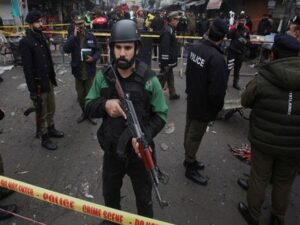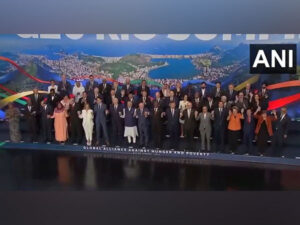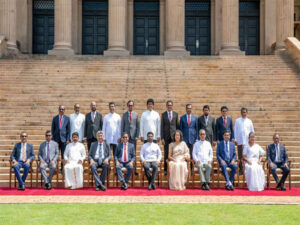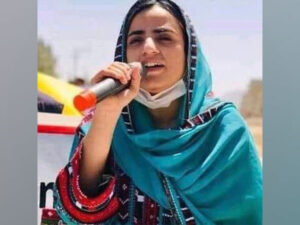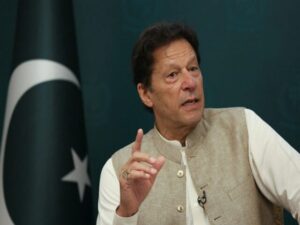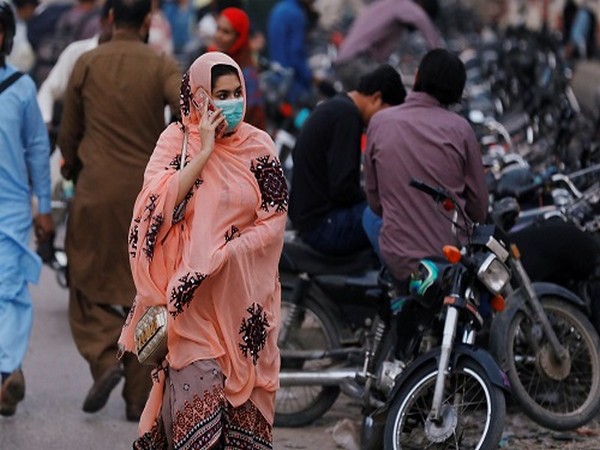
A woman wears a protective mask while walking along a road as the outbreak of the coronavirus disease (COVID-19) continues, in Karachi, Pakistan December 2, 2020. REUTERS/Akhtar Soomro - RC22FK9YQ20Y
Islamabad [Pakistan], February 16 (ANI): The Pakistan government needs to double its effort for women’s empowerment as the country’s ranking on gender equality remains to be poor, indicating deep-seated patriarchy in the society that ensures persistent structural discrimination, according to a media report.
Pakistan must become the lead proponent for improved ranking methodologies that can account for the experience of developing countries beyond their geographic region and income levels, by including population size, or violent conflict that keep countries such as Afghanistan, Syria, Iraq, etc at a constant disadvantage, reported The News International.
Creating a Pakistan-specific Gender Equality and Empowerment Index based on its unique pathway, it can illustrate the case of South Asia. To achieve this, the government should allocate more resources for gender data and policy implementation, and value its partnership with civil society. By taking a lead advocacy role internationally not only would Pakistan do itself a favor but it will also contribute significantly to the case of the developing world, said the Pakistani publication.
In the developing world, the development processes are different and to demonstrate this, Pakistan must develop its own gender equality indices that encapsulate its unique path to gender empowerment. As Pakistan‘s improved gender parity in higher education and the civil service should be recognized and the decrease in violence against women should be noted. Pakistan needs to generate new data where needed, supplement partially available data and utilize its extensive administrative data fully, and standardize all data to improve its ranking.
Violence against women surges in Pakistan as officials arrest two for abducting, selling women
Lahore [Pakistan], February 16 (ANI): Violence against women is on the surge in Pakistan as officials in Lahore have arrested the two people involved in the abduction of girls and selling them in other provinces, reported local media. Two people involved in the abduction of girls and selling them in other provinces have been arrested, Dawn quoted SSP Investigations Lahore Imran Kishwar in a press conference at his office here on Tuesday.
The arrested suspects were proclaimed offenders (POs) and were identified as Faisal and Ashfaq Butt. In the recent past, they had lured a 19-year-old girl, Diya Akram, on the pretext of giving her a job and took her to Karachi, said the Pakistani publication.
According to Dawn, from there, they shifted her to Balochistan and sold her to a feudal of Jhal Magsi Balochistan. They were also wanted in other cases, the SSP said and added that one of the arrested suspects extracted over Rs10 million from a citizen after posing as an FIA officer.
Police arrested a man posing as an Elite official at the Shera Kot check post. The suspect identified as Zia-ul-Rehman posed as a cop of Elite force. On suspicion, police investigated and found him an imposter. Police arrested him and recovered a weapon after registering a case.
It came a report last year underlined that nearly a thousand minor girls and women from Pakistan‘s religious minorities including Hindus and Christians face violence and in most cases they are abducted, forcefully converted to Islam, and are married off every year.
Citing an inquiry done by the British-led All-Party Parliamentary Group (APPG), Islam Khabar reported that the figure is an estimation based on extensive probe, but not accurate since “true numbers may never be ascertained. “The report, which was published in September 2021 focuses on the cases of Christian and Hindu girls between the ages of 12-25, of religious minorities including Hindus (1.59 per cent) and Christians (1.60 per cent) of Pakistan‘s 220 million population, Islam Khabar reported. Buddhists, Sikhs, and Kalash are also surveyed with the help of their representative bodies, field surveys, and by individuals who appeared before the probe body. (ANI)
According to The News International, Pakistan‘s sustainable development goal machinery must undertake more advocacy at the UN SDGs Secretariat for valuing improvements in Tier 2 indicators with a note to indicate progress. And, indicators with partial data availability be reconfigured in phases, starting with basic statistics and moving to more complex coverage in a predetermined time frame.
This is critical as 71 per cent Tier 2 indicators in Goal 5 are omitted from the ranking. (ANI)






